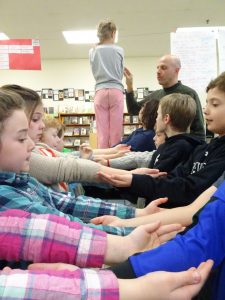 If I had to choose one phrase as a summary of this week I would choose, Learning Community. Our week began with a Trust Fall Challenge with Mr. Caron and ended with a Secret Friend Celebration. At the start of the week everyone took the risk to fall – a first in all my years participating in this challenge. HOW COOL IS THAT! Yesterday we enjoyed lunch together and the sharing of gifts. The time passed in a snap! Thank you for connecting home and school through your conversations and your support of projects that need time and help. Thank you too for your generous donations for the luncheon. I also appreciate your thoughtful emails with questions and concerns. They make me think of ways I can help our class be more successful. I am grateful for your interest, time and attention.
If I had to choose one phrase as a summary of this week I would choose, Learning Community. Our week began with a Trust Fall Challenge with Mr. Caron and ended with a Secret Friend Celebration. At the start of the week everyone took the risk to fall – a first in all my years participating in this challenge. HOW COOL IS THAT! Yesterday we enjoyed lunch together and the sharing of gifts. The time passed in a snap! Thank you for connecting home and school through your conversations and your support of projects that need time and help. Thank you too for your generous donations for the luncheon. I also appreciate your thoughtful emails with questions and concerns. They make me think of ways I can help our class be more successful. I am grateful for your interest, time and attention.
Learning About Metacognition and Mindfulness
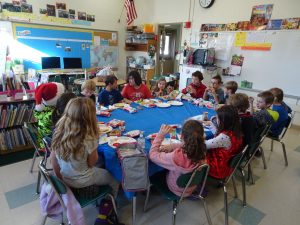 We’ve continued having thoughtful conversations about learning and what we can each do to challenge ourselves. We’ve asked a lot of questions. What is learning? How do you know you are learning? Are some things we learn more important then others? Each morning for the past two weeks we’ve been trying to notice and note things that we’ve learned each day. The goal of this process is to provide the children with to opportunity to recognize that they are in charge of their own learning. They can choose how much they invest in their own learning. They can create their own challenges within each task – should I work fast to be the first done or should I think about trying something I’ve never done before? If something is easy, is it worth doing? If something it hard, is it worth doing? I can I turn something that seems easy into something I can learn from? There are no set answers to these questions. And sometimes we’ve been surprised by what we discover in our conversations.
We’ve continued having thoughtful conversations about learning and what we can each do to challenge ourselves. We’ve asked a lot of questions. What is learning? How do you know you are learning? Are some things we learn more important then others? Each morning for the past two weeks we’ve been trying to notice and note things that we’ve learned each day. The goal of this process is to provide the children with to opportunity to recognize that they are in charge of their own learning. They can choose how much they invest in their own learning. They can create their own challenges within each task – should I work fast to be the first done or should I think about trying something I’ve never done before? If something is easy, is it worth doing? If something it hard, is it worth doing? I can I turn something that seems easy into something I can learn from? There are no set answers to these questions. And sometimes we’ve been surprised by what we discover in our conversations.
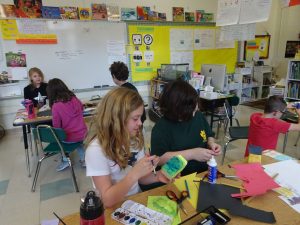 We’ve also spent some time, both in the classroom and with Ms. Vas, learning about mindfulness. Ms. Vas began teaching us some deep breathing techniques this week. We are hoping this practice will help us match our response to the size of the problem more often. We’ll become more focused and be better able to
We’ve also spent some time, both in the classroom and with Ms. Vas, learning about mindfulness. Ms. Vas began teaching us some deep breathing techniques this week. We are hoping this practice will help us match our response to the size of the problem more often. We’ll become more focused and be better able to
Creating a Map of Sassafras Springs
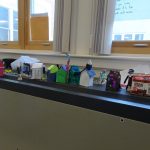
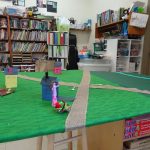 We finished reading The Seven Wonders of Sassafras Springs. Eben did find seven Wonders, but he wasn’t able to go to Colorado because of an outbreak of influenza. He did get to go to St. Louis though and he also learned the value of community. In the book Eben thought, “I sat there, thinking about the Wonders as the evening shadows settled over the barnyard. A doll. A bookcase. A saw. A table. A ship in a bottle. A woven cloth. They were all as unimpressive and ordinary as Sassafras Springs, yet each in its own way was a one-of-a-kind marvel.”
We finished reading The Seven Wonders of Sassafras Springs. Eben did find seven Wonders, but he wasn’t able to go to Colorado because of an outbreak of influenza. He did get to go to St. Louis though and he also learned the value of community. In the book Eben thought, “I sat there, thinking about the Wonders as the evening shadows settled over the barnyard. A doll. A bookcase. A saw. A table. A ship in a bottle. A woven cloth. They were all as unimpressive and ordinary as Sassafras Springs, yet each in its own way was a one-of-a-kind marvel.”
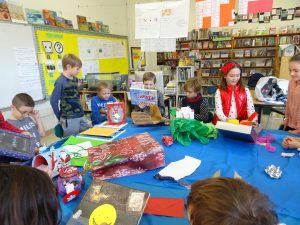 And Uncle Alf, the creator of the seventh Wonder reminded Eben, “Now that you’ve found seven Wonders, I’ll bet you’ll notice new ones every day.” We think we could look for Wonders too.
And Uncle Alf, the creator of the seventh Wonder reminded Eben, “Now that you’ve found seven Wonders, I’ll bet you’ll notice new ones every day.” We think we could look for Wonders too.
After finishing we decided to build of map showing what we think of as the fifteen most important people and places in the town. We used clothespins for people just like Aunt Pretty did in the story and we used milk cartons for the base of the buildings. We’re adding details to our yards and features to our map. This is an example of the project that is simple, but can be turned into more of a challenge by thinking about how we can add details to make the scene more realistic. We’re having fun following our imagination.
Why is Snow White?
Snow Angles
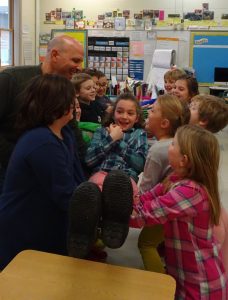 We also revisited angles in math while looking at different snowflakes. There are many ways to look at the angles of a snow crystal. Once you start looking it seems as though you can’t stop.
We also revisited angles in math while looking at different snowflakes. There are many ways to look at the angles of a snow crystal. Once you start looking it seems as though you can’t stop.
We also discovered why snow looks white when it is made of something clear. We
had fun discovering how and why something transparent becomes more opaque.
Bits and Pieces:
- Mrs. Hyett visited us on Tuesday to share some Hanukkah traditions. We had sufganyot (jelly doughnuts) and gelt.
- We continued to talk about The Size of the Problem and The Size of the Reaction with Ms. Vas.
- We each selected our country for our global geography project.
- And we hope to collect family stories over the vacation.
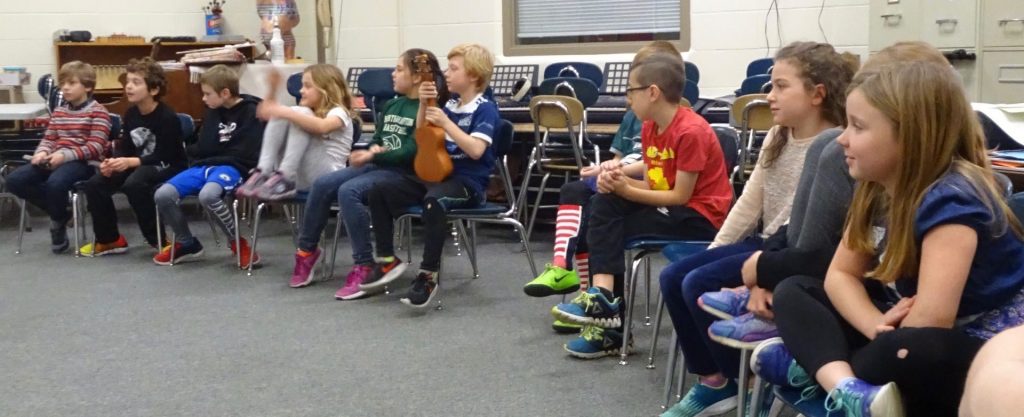
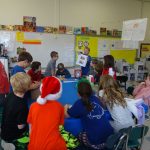
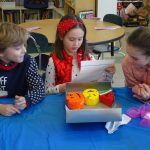

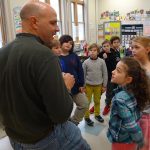
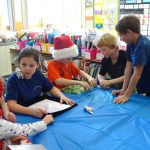
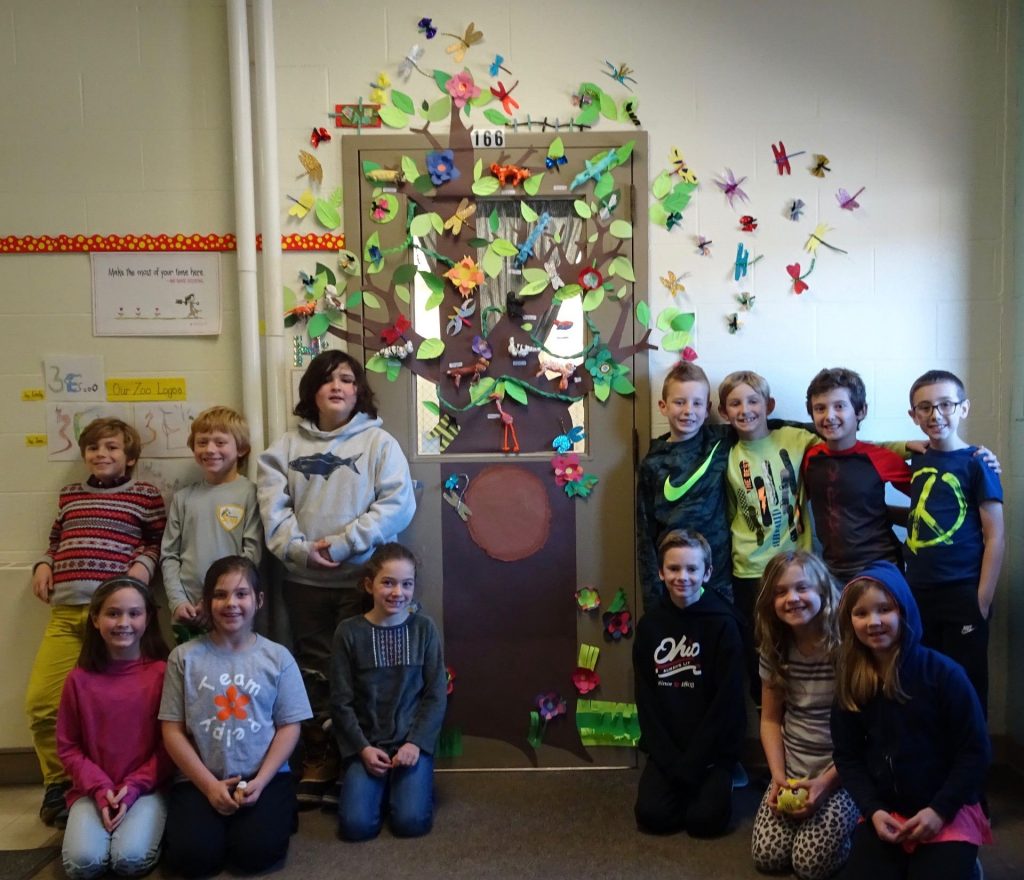 It is certainly an exciting time of year. There’s a lot going on everywhere. The children are busy, excited and tired. Please encourage them to make an extra effort to be safe and kind to each other.
It is certainly an exciting time of year. There’s a lot going on everywhere. The children are busy, excited and tired. Please encourage them to make an extra effort to be safe and kind to each other.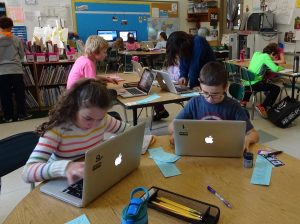 Last week I wrote about changes I hoped to implement in our classroom based on several discussions at parent conferences. We began one this week. We’ve taken steps to slow down and notice how we can be our best in the present. Our Social and Emotional Learning has centered self-control and taking the perspective of others this week. We’ve been looking for ways to practice mindfulness more often in our classroom. Ask your child about The Three Questions and their answers. If you’re not familiar with this book, it is one you can read often. You’ll think of or notice something different with each reading.
Last week I wrote about changes I hoped to implement in our classroom based on several discussions at parent conferences. We began one this week. We’ve taken steps to slow down and notice how we can be our best in the present. Our Social and Emotional Learning has centered self-control and taking the perspective of others this week. We’ve been looking for ways to practice mindfulness more often in our classroom. Ask your child about The Three Questions and their answers. If you’re not familiar with this book, it is one you can read often. You’ll think of or notice something different with each reading.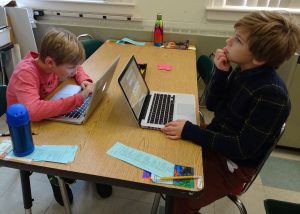 We began a daily reflective practice of attempting to identify something we’ve learned each day. The first thing we do each morning is to jot something down what we think we’ve learned. We’re working to note and notice events of learning. We’re developing our abilities to reflect and become more aware of when and how we learn. It’s not easy at all. If you give it a try you may discover, as I did, that the expression, “You learn something new every day” is a challenging adage to live up to. Some children are sharing what they are doing, “I learned be aggressive on the basketball court.” Or “I played wall ball in the snow.” Others are writing about things they’ve observed, “I saw a flock of birds. I noticed it because it was in a cursive v and I never saw a flock of birds like that.” Some recorded things they have done at school, “I can make very cool paper leaves,” but most are recalling things they have done outside of school. “I learned how to make pumpkin bread.”
We began a daily reflective practice of attempting to identify something we’ve learned each day. The first thing we do each morning is to jot something down what we think we’ve learned. We’re working to note and notice events of learning. We’re developing our abilities to reflect and become more aware of when and how we learn. It’s not easy at all. If you give it a try you may discover, as I did, that the expression, “You learn something new every day” is a challenging adage to live up to. Some children are sharing what they are doing, “I learned be aggressive on the basketball court.” Or “I played wall ball in the snow.” Others are writing about things they’ve observed, “I saw a flock of birds. I noticed it because it was in a cursive v and I never saw a flock of birds like that.” Some recorded things they have done at school, “I can make very cool paper leaves,” but most are recalling things they have done outside of school. “I learned how to make pumpkin bread.”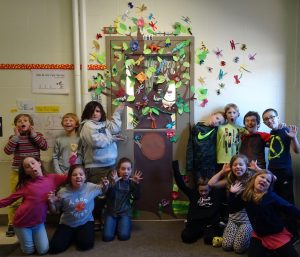 4th grade issued a challenge to “Deck the Halls.” They are responsible for this month’s Community meeting AND are preparing for their community service project to sing carols to residents of local nursing homes. They’ll be sharing our doors in this process.
4th grade issued a challenge to “Deck the Halls.” They are responsible for this month’s Community meeting AND are preparing for their community service project to sing carols to residents of local nursing homes. They’ll be sharing our doors in this process.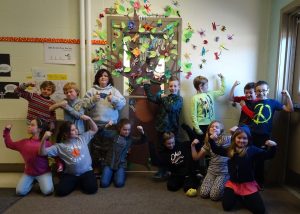 Throughout this process we read several books, including This is the Earth and Lots: Celebrating Diversity on Earth. They helped add meaning to the last verse of a favorite song in our classroom, Habitat: “People are different from foxes and rabbits, We effect the whole world with our bad habits, Better to love it while we still have it, Or rat-a-tat-tat our habitat’s gone.” We talked about what it means to be stewards of our Earth. Every little thing counts: don’t take more than you need, try not to waste supplies, turn off the lights, reuse whatever you can… You may want to extend this conversation at home by talking about how your family conserves and cares for Earth as well.
Throughout this process we read several books, including This is the Earth and Lots: Celebrating Diversity on Earth. They helped add meaning to the last verse of a favorite song in our classroom, Habitat: “People are different from foxes and rabbits, We effect the whole world with our bad habits, Better to love it while we still have it, Or rat-a-tat-tat our habitat’s gone.” We talked about what it means to be stewards of our Earth. Every little thing counts: don’t take more than you need, try not to waste supplies, turn off the lights, reuse whatever you can… You may want to extend this conversation at home by talking about how your family conserves and cares for Earth as well. In math this week we’ve been learning about time, reading and comparing analog and digital clocks. We are getting better at reading the time and at accounting for elapsed time. We are using telling time as another tool to help us master the 5’s table in multiplication as well. Several of the children have made that connection. As we continue to practice reading clocks and identifying the time more are sure to make that connection.
In math this week we’ve been learning about time, reading and comparing analog and digital clocks. We are getting better at reading the time and at accounting for elapsed time. We are using telling time as another tool to help us master the 5’s table in multiplication as well. Several of the children have made that connection. As we continue to practice reading clocks and identifying the time more are sure to make that connection.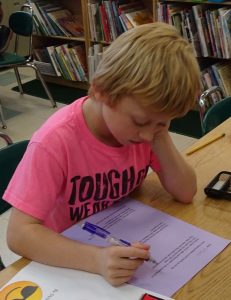 This week took another round of timed fact checks, adding multiplication into the mix. Thank you for your attention to this at home by playing games and helping your child practice. The facts are learned through lots of repetition. Some of the children feel discouraged, “I’m just not good at this” or “I can’t do this.” Please help them realize they most definitely CAN accomplish this goal if they want to. It will take focus and determined action on their part. It won’t just wash over them between now and the next fact check. Despite how the children felt about the fact check, the class made great improvement.
This week took another round of timed fact checks, adding multiplication into the mix. Thank you for your attention to this at home by playing games and helping your child practice. The facts are learned through lots of repetition. Some of the children feel discouraged, “I’m just not good at this” or “I can’t do this.” Please help them realize they most definitely CAN accomplish this goal if they want to. It will take focus and determined action on their part. It won’t just wash over them between now and the next fact check. Despite how the children felt about the fact check, the class made great improvement.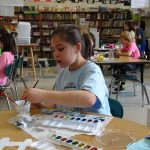 We’ve started our collection of interview questions to help us gather family stories. I hope over the break children will have time to collect a few.
We’ve started our collection of interview questions to help us gather family stories. I hope over the break children will have time to collect a few.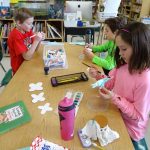 While we built our Tree of Life, we put a hold on learning more about mapping and our world. I hope that by the end of next week the children will have selected a country to research and become an expert on.
While we built our Tree of Life, we put a hold on learning more about mapping and our world. I hope that by the end of next week the children will have selected a country to research and become an expert on.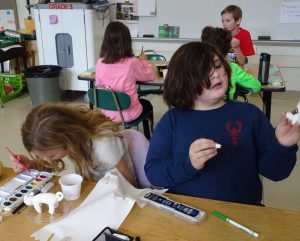
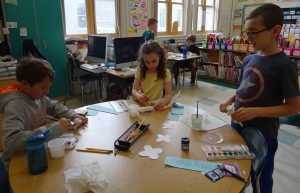
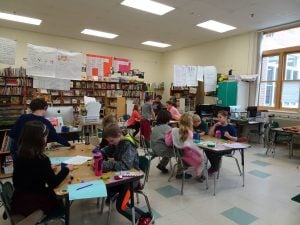 I have appreciated meeting and planning with you about how we can best support your child’s learning during the next part of the school year. Thank you for your time and effort. Because of our conversations, I’ll be planning more frequent small group opportunities, begin some reflective journaling designed to help children become more self-directed and setting aside a corner of the classroom as a recording studio where children can document their understanding and comprehension orally. I look forward to discovering how these options will add to the opportunities of our classroom.
I have appreciated meeting and planning with you about how we can best support your child’s learning during the next part of the school year. Thank you for your time and effort. Because of our conversations, I’ll be planning more frequent small group opportunities, begin some reflective journaling designed to help children become more self-directed and setting aside a corner of the classroom as a recording studio where children can document their understanding and comprehension orally. I look forward to discovering how these options will add to the opportunities of our classroom.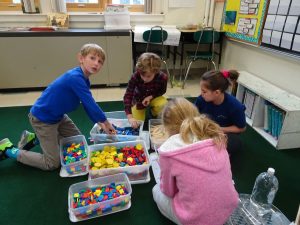 This week we explored maps. We read about them. We learned that most maps have six basic elements: keys (or legends), a compass rose, a scale, a title, labels and symbols. We put map puzzles together. We tried to create paper maps of the world. We drew maps of the classroom and worked as teams to create a 3-D map of our classroom. We tried including all of the elements (excluding scale) when we created maps of our yards. Next week we’ll be using our maps to lead us into some personal narratives telling about the places we play and the stories that grow from our games and imagination.
This week we explored maps. We read about them. We learned that most maps have six basic elements: keys (or legends), a compass rose, a scale, a title, labels and symbols. We put map puzzles together. We tried to create paper maps of the world. We drew maps of the classroom and worked as teams to create a 3-D map of our classroom. We tried including all of the elements (excluding scale) when we created maps of our yards. Next week we’ll be using our maps to lead us into some personal narratives telling about the places we play and the stories that grow from our games and imagination. In addition to mapping we’ve been exploring the ways people divide up and label the places that we live. It is abstract and seems to feel random to the children. We live in neighborhoods, towns, counties, states, countries and continents. You can see from some of the work sent home this week that this can be confusing. It is interesting to learn about our place in the world and it is interesting to understand how others live as well – the same, but different. Next week the children will be selecting a country to research and share with others.
In addition to mapping we’ve been exploring the ways people divide up and label the places that we live. It is abstract and seems to feel random to the children. We live in neighborhoods, towns, counties, states, countries and continents. You can see from some of the work sent home this week that this can be confusing. It is interesting to learn about our place in the world and it is interesting to understand how others live as well – the same, but different. Next week the children will be selecting a country to research and share with others.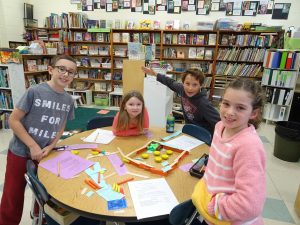 Also next week, the class will develop a set of interview questions. We hope to be able to talk to extended family members and uncover their stories from third grade (or there about) as well. We are hoping to ask grandparents, aunts and uncles, cousins or special family friends to share stories. After the December break, we’ll try to write some of those stories down too. When each of the children has collected a handful to stories, they’ll be asked to choose one to develop, revise and polish until it is ready to be published.
Also next week, the class will develop a set of interview questions. We hope to be able to talk to extended family members and uncover their stories from third grade (or there about) as well. We are hoping to ask grandparents, aunts and uncles, cousins or special family friends to share stories. After the December break, we’ll try to write some of those stories down too. When each of the children has collected a handful to stories, they’ll be asked to choose one to develop, revise and polish until it is ready to be published.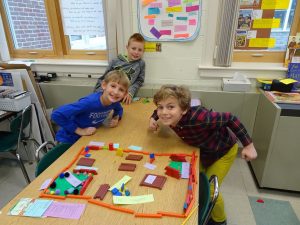 We’ve begun to learn about sketch-noting as a tool to enhance comprehension. We’re learning more about visualizing and adding actions and details to our mind pictures as we listen to read-alouds and also as we read independently.
We’ve begun to learn about sketch-noting as a tool to enhance comprehension. We’re learning more about visualizing and adding actions and details to our mind pictures as we listen to read-alouds and also as we read independently.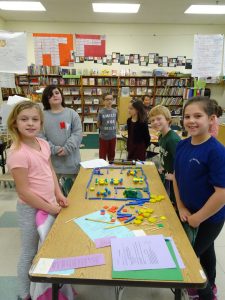 It would be greatly appreciated if you could find time to talk with your child about what it means at your house to put forth one’s best effort. For some children, it seems, working fast is best. That means they skim across the activities doing what they already know rather than extending them to learn “new”. As a result, expectations are only partially met. For other children it seems as though assignments are secondary, being social comes first. Conversation consumes their time. They approach tasks as if they can get them done eventually. As a result of these choices, expectations are seldom met. They simply run out of time. All of the children need support with organizing, prioritizing and managing time. They need to find ways to listen to their inner voice as they explore ideas and find opportunities for learning in all they do whether simple or complex. Our new learning journals are an attempt in the classroom to build these understandings, deepen thinking and strengthen self-monitoring skills. Thank you for your help in exploring these ideas with your child. It is exciting to see how learning grows.
It would be greatly appreciated if you could find time to talk with your child about what it means at your house to put forth one’s best effort. For some children, it seems, working fast is best. That means they skim across the activities doing what they already know rather than extending them to learn “new”. As a result, expectations are only partially met. For other children it seems as though assignments are secondary, being social comes first. Conversation consumes their time. They approach tasks as if they can get them done eventually. As a result of these choices, expectations are seldom met. They simply run out of time. All of the children need support with organizing, prioritizing and managing time. They need to find ways to listen to their inner voice as they explore ideas and find opportunities for learning in all they do whether simple or complex. Our new learning journals are an attempt in the classroom to build these understandings, deepen thinking and strengthen self-monitoring skills. Thank you for your help in exploring these ideas with your child. It is exciting to see how learning grows.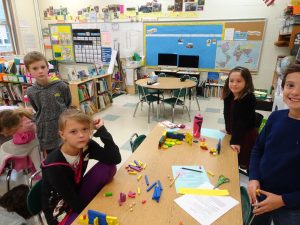
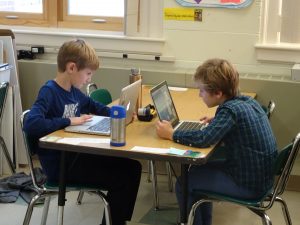
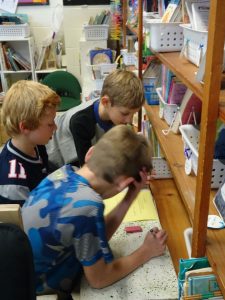 We’ve done a great deal since the last note home. We went to the New Hampshire Farm Museum in Milford to learn lots about living in the mid-1800s. We’ve created and shared our animals and habitats at the Animal Wonderland. And we’ve shared our goals for learning during our student led conferences. Each of these special things happened while we continued on with reading, writing, math and content studies each day as well. Thank you for encouraging and supporting these efforts by talking about them at home and encouraging your child to think more about learning.
We’ve done a great deal since the last note home. We went to the New Hampshire Farm Museum in Milford to learn lots about living in the mid-1800s. We’ve created and shared our animals and habitats at the Animal Wonderland. And we’ve shared our goals for learning during our student led conferences. Each of these special things happened while we continued on with reading, writing, math and content studies each day as well. Thank you for encouraging and supporting these efforts by talking about them at home and encouraging your child to think more about learning.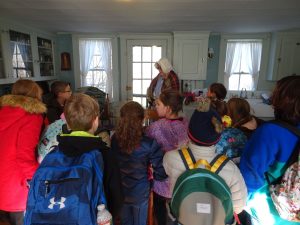 Two weeks ago we learned that Sarah Hale spent over twenty years trying to persuade the country to declare Thanksgiving a national holiday. She thought a day should be set aside for gratitude and she thought it should be a national observance that could make our country stronger. Four presidents disagreed, but the fifth, Abraham Lincoln, just after the battle of Gettysburg, agreed. He too could see that our country needed a time to reflect on good during a very sad time.
Two weeks ago we learned that Sarah Hale spent over twenty years trying to persuade the country to declare Thanksgiving a national holiday. She thought a day should be set aside for gratitude and she thought it should be a national observance that could make our country stronger. Four presidents disagreed, but the fifth, Abraham Lincoln, just after the battle of Gettysburg, agreed. He too could see that our country needed a time to reflect on good during a very sad time.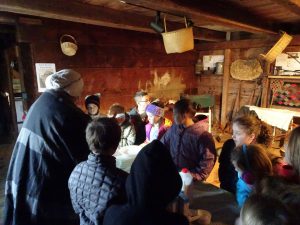 It was interesting to get a glimpse of what family life was at that time at the farm museum. It was different to be sure and while we had fun doing the work on that one cold day, we could see that it might be tough to keep it up day after day.
It was interesting to get a glimpse of what family life was at that time at the farm museum. It was different to be sure and while we had fun doing the work on that one cold day, we could see that it might be tough to keep it up day after day.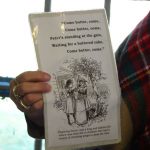 We’ve also learned lots of different things related to the history of Thanksgiving in our book clubs. Talk to your child about the book he or she chose to read and the information it shares about our national celebration.
We’ve also learned lots of different things related to the history of Thanksgiving in our book clubs. Talk to your child about the book he or she chose to read and the information it shares about our national celebration.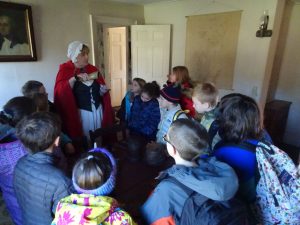
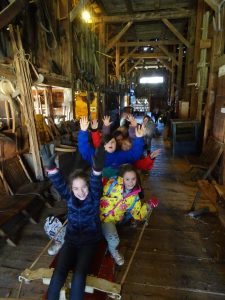
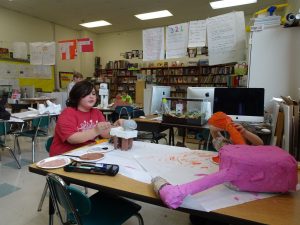
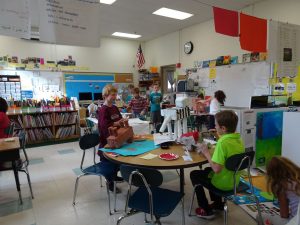
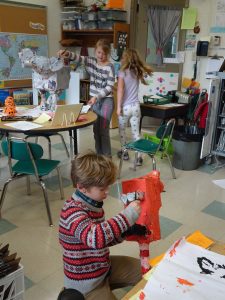
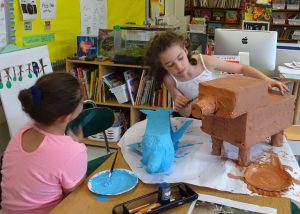
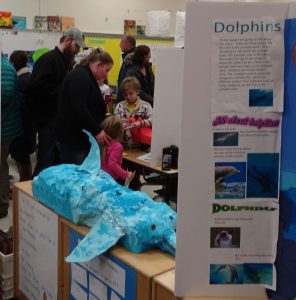
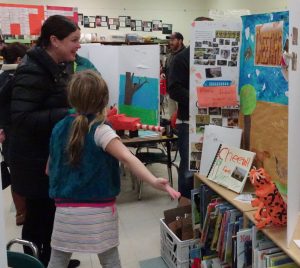
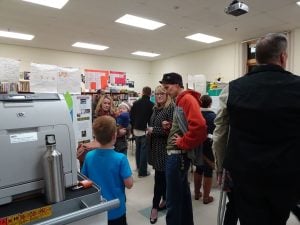
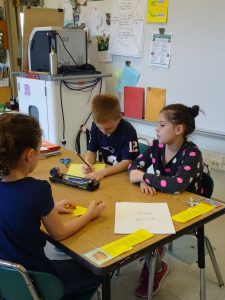 I appreciate the opportunity to listen to the children share their work with you. It is one thing to talk about learning goals in the classroom and to encourage each learner to reflect on what he or she is doing in a way that helps them achieve even more. It is another thing to share and explain that makes that talk real. Thinking about thinking and learning matters. That reflection deepens understanding and third graders are just beginning stages to recognize this. Given opportunities to practice, they will become powerful thinkers. When you ask your child to tell you more about his or her thinking, you are stretching them even more. Why do you want to read a fatter book? How will reading more pages make you a stronger reader? Why do you want to solve problems quickly? How will being fast make you a more skilled mathematician? Each question helps them pause and consider how they can develop more purposeful goals and become confident, self-directed, lifelong learners.
I appreciate the opportunity to listen to the children share their work with you. It is one thing to talk about learning goals in the classroom and to encourage each learner to reflect on what he or she is doing in a way that helps them achieve even more. It is another thing to share and explain that makes that talk real. Thinking about thinking and learning matters. That reflection deepens understanding and third graders are just beginning stages to recognize this. Given opportunities to practice, they will become powerful thinkers. When you ask your child to tell you more about his or her thinking, you are stretching them even more. Why do you want to read a fatter book? How will reading more pages make you a stronger reader? Why do you want to solve problems quickly? How will being fast make you a more skilled mathematician? Each question helps them pause and consider how they can develop more purposeful goals and become confident, self-directed, lifelong learners.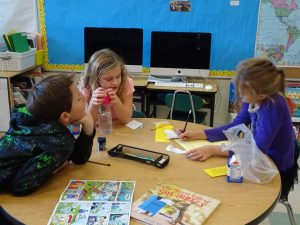 Global Geography and Mapping
Global Geography and Mapping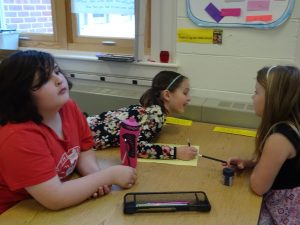 Eben’s begun collecting
Eben’s begun collecting